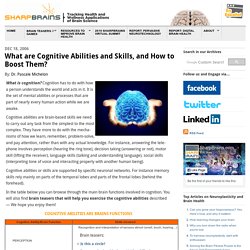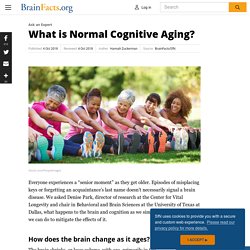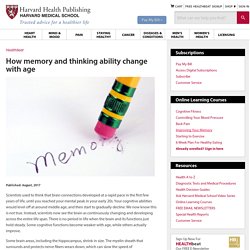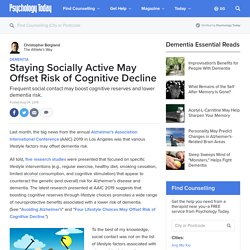

What are Cognitive Skills and Abilities? By: Dr.

Pascale Michelon What is cognition? Cognition has to do with how a person understands the world and acts in it. It is the set of mental abilities or processes that are part of nearly every human action while we are awake. Cognitive abilities are brain-based skills we need to carry out any task from the simplest to the most complex. Cognitive abilities or skills are supported by specific neuronal networks. In the table below you can browse through the main brain functions involved in cognition. With age, some cognitive abilities tend to decline, especially the so-called executive functions, and those cognitive abilities that are not used regularly. Introduction to Ageing and Cognitive Abilities. What is Normal Cognitive Aging? iStock.com/PeopleImages Everyone experiences a “senior moment” as they get older.

Episodes of misplacing keys or forgetting an acquaintance’s last name doesn’t necessarily signal a brain disease. We asked Denise Park, director of research at the Center for Vital Longevity and chair in Behavioral and Brain Sciences at the University of Texas at Dallas, what happens to the brain and cognition as we simply get older and what we can do to mitigate the effects of it. How does the brain change as it ages? How memory and thinking ability change with age. Scientists used to think that brain connections developed at a rapid pace in the first few years of life, until you reached your mental peak in your early 20s.

Your cognitive abilities would level off at around middle age, and then start to gradually decline. We now know this is not true. Instead, scientists now see the brain as continuously changing and developing across the entire life span. There is no period in life when the brain and its functions just hold steady. Some cognitive functions become weaker with age, while others actually improve. Some brain areas, including the hippocampus, shrink in size. On the other hand, the branching of dendrites increases, and connections between distant brain areas strengthen. Age is also the biggest risk factor for many brain diseases, most of which affect brain structure and function.
Dementia. Mild Cognitive Impairment. Cross-Sectional and Longitudinal Associations of Different Sedentary Behaviours with Cognitive Performance in Older Adults. Sedentary behavior as a risk factor for cognitive decline? A focus on the influence of glycemic control in brain health. Changes in physical activity and cognitive decline in older adults living in the community.
An active and socially integrated lifestyle in late life might protect against dementia. Enrichment Effects on Adult Cognitive Development. Exploring Interventions to Reduce Cognitive Decline in Ageing. Can Exercise Improve Cognitive Function in Older Adults? Effects of Exercise on Cognitive Abilities of Older Adults. The Impact of Tai Chi on Cognitive Performance in Older Adults. Which type of social activities may reduce cognitive decline in the elderly? Staying Socially Active May Offset Risk of Cognitive Decline. Last month, the big news from the annual Alzheimer's Association International Conference (AAIC) 2019 in Los Angeles was that various lifestyle factors may offset dementia risk.

All told, five research studies were presented that focused on specific lifestyle interventions (e.g., regular exercise, healthy diet, smoking cessation, limited alcohol consumption, and cognitive stimulation) that appear to counteract the genetic (and overall) risk for Alzheimer's disease and dementia. The latest research presented at AAIC 2019 suggests that boosting cognitive reserves through lifestyle choices promotes a wide range of neuroprotective benefits associated with a lower risk of dementia.
Late Life Social Activity and Cognitive Decline in Old Age. Importance of Social Activities for Seniors. Can Mentally Stimulating Activities Reduce the Risk of Mild Cognitive Impairment in Older Adults? Want to keep your brain sharp in old age? Go back to school. New research shows the brain has the ability to function well — and even excel — in old age.

The secret? Keep learning. "Learning is the mechanism for development no matter how old you are," said Rachel Wu, an assistant professor of psychology at the University of California Riverside and the author of research published Wednesday in the Journals of Gerontology, Series B. Wu's study took an ambitious approach: have seniors in their 60s, 70s and 80s immerse themselves in a college-like atmosphere, enrolling in three somewhat rigorous courses simultaneously.
They participated in at least 15 hours of class a week, and also did homework assignments, over three months. The results were impressive: After just six weeks, participants' scores on standardized tests assessing thinking and memory abilities were similar to a middle-age adult's scores — a significant improvement over their scores before the study began. That is, their brains functioned more like those of a person 30 years younger.